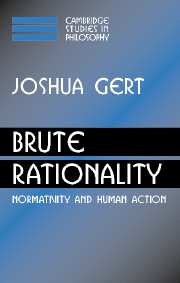Book contents
- Frontmatter
- Contents
- Preface and acknowledgements
- 1 What would an adequate theory of rationality be like?
- 2 Practical rationality, morality, and purely justificatory reasons
- 3 The criticism from internalism about practical reasons
- 4 A functional role analysis of reasons
- 5 Accounting for our actual normative judgments
- 6 Fitting the view into the contemporary debate
- 7 Two concepts of rationality
- 8 Internalism and different kinds of reasons
- 9 Brute rationality
- References
- Index
9 - Brute rationality
Published online by Cambridge University Press: 22 September 2009
- Frontmatter
- Contents
- Preface and acknowledgements
- 1 What would an adequate theory of rationality be like?
- 2 Practical rationality, morality, and purely justificatory reasons
- 3 The criticism from internalism about practical reasons
- 4 A functional role analysis of reasons
- 5 Accounting for our actual normative judgments
- 6 Fitting the view into the contemporary debate
- 7 Two concepts of rationality
- 8 Internalism and different kinds of reasons
- 9 Brute rationality
- References
- Index
Summary
One significant implication of the view of rationality offered in chapter 7 is that as long as an action does not stem from the kind of mental malfunction that would put the agent at increased risk of suffering harms without compensating benefits for anyone else, that person's action is subjectively rational. However, many contemporary philosophers hold that for an action to be rational in this sense, or even intelligible, it must somehow involve the judgment, by the agent, that the ends of the action are good. For example, Jonathan Dancy, Warren Quinn, Joseph Raz, and Thomas Scanlon have recently and independently presented theories according to which intentional action is action undertaken for a reason, and undertaking an action for a reason requires that one see something in the action as being of value, or as being a reason-giving feature. Not surprisingly these philosophers also hold that we have desires for reasons, at least when these desires are not simply urges that seize us. Having a desire for a reason involves, for Scanlon and for Raz, the judgment that the object of the desire is good in some way, while Quinn holds that the same sort of judgment is required in order for an action to be rational. And Dancy holds that the reasons for which an agent acts, whether good or bad, must at least be regarded by the agent as favoring the action.
- Type
- Chapter
- Information
- Brute RationalityNormativity and Human Action, pp. 186 - 220Publisher: Cambridge University PressPrint publication year: 2004



